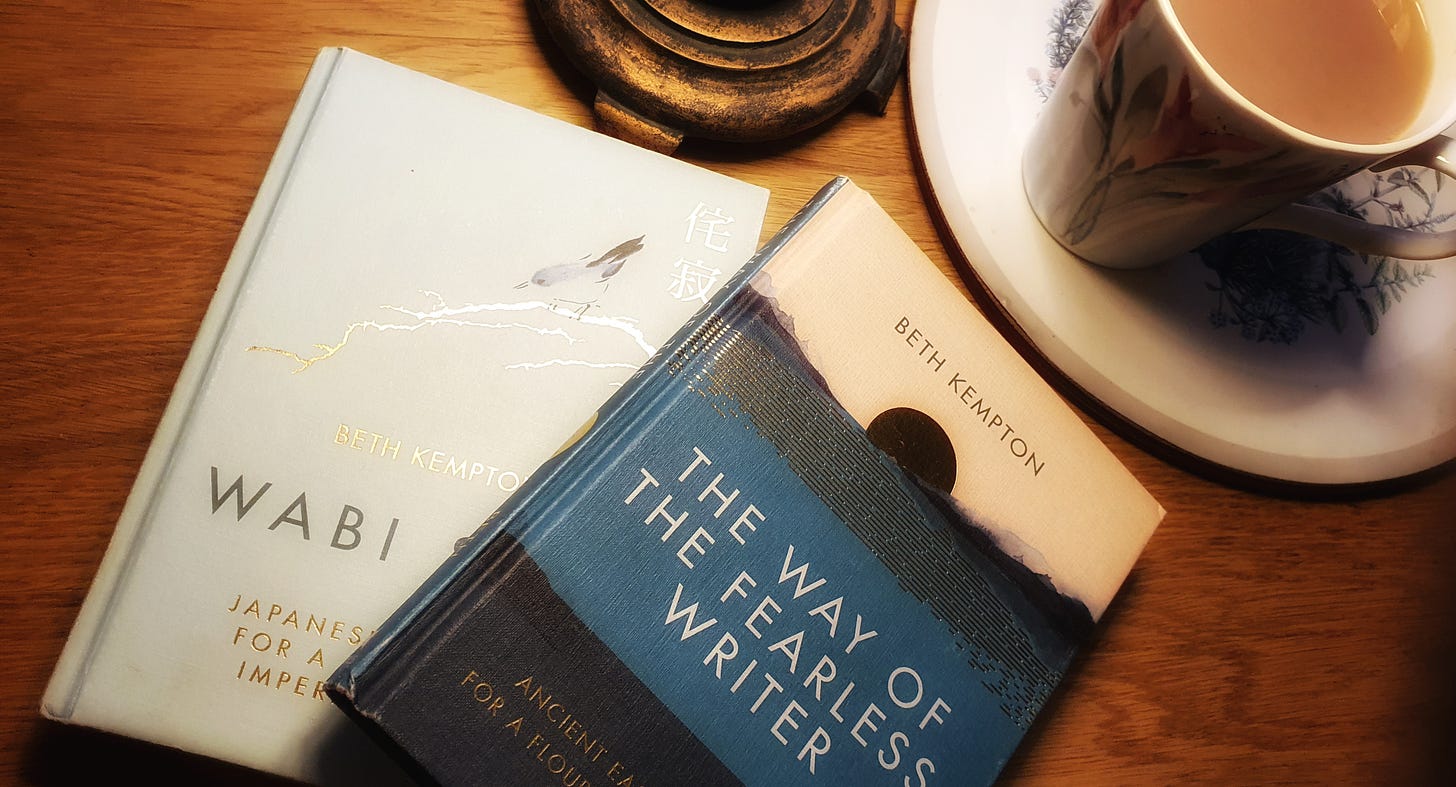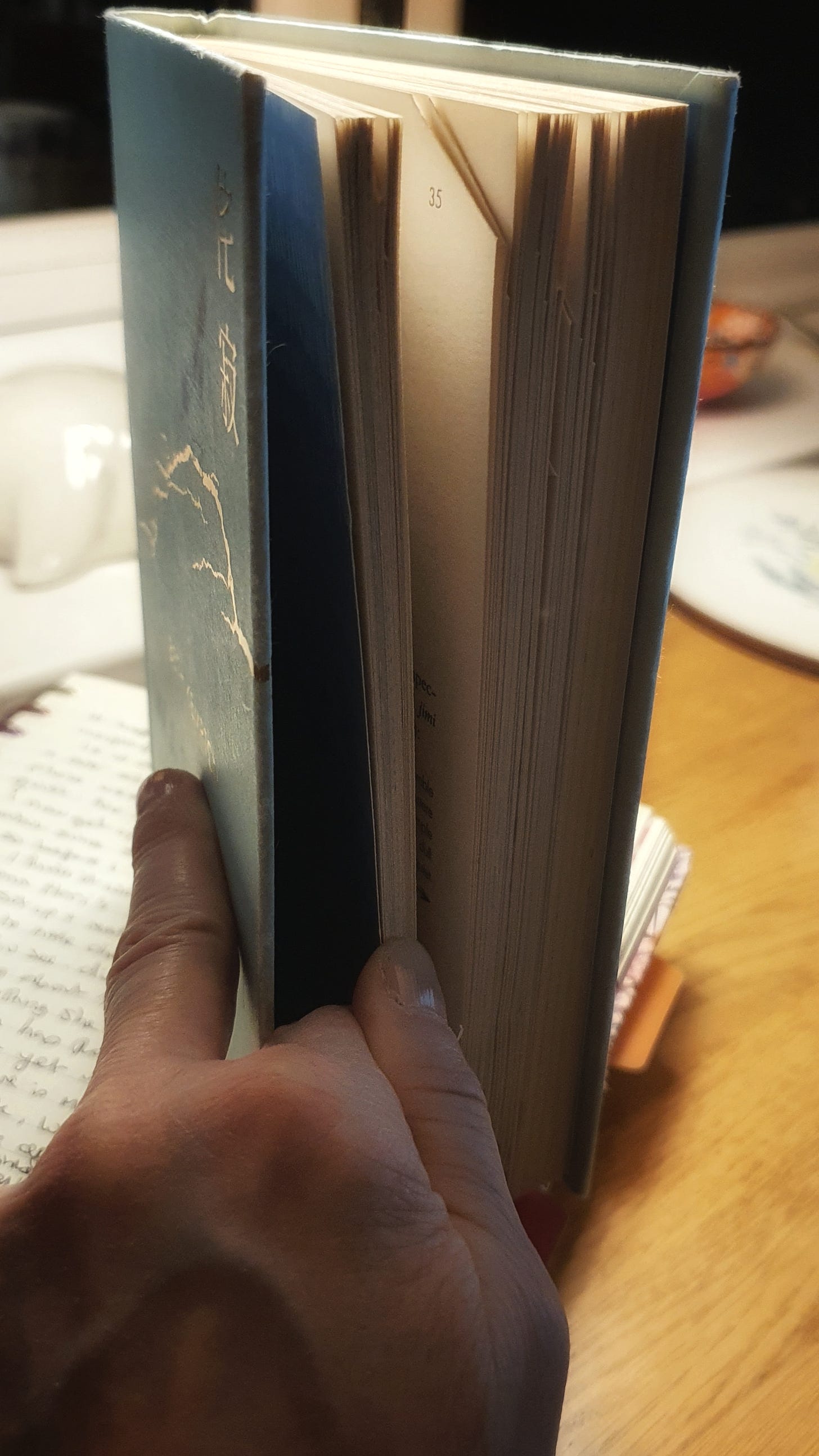I’m re-reading Beth Kempton’s The way of The Fearless Writer. I got so far through last year and then stopped. Painting took over any writing aspirations. I’d begun to write a few short poems. I loved writing these poems but then I doubted myself and stopped. Decided I was an artist painter not a writer.
I understand now, I can be both. One is not mutually exclusive to the other.
Going back to this little gem of a book, I find very many turned corners, indicating I’d discovered something wonderful. Something that resonated deeply or that had clicked in my brain.
Why do I keep forgetting what I desperately want to remember?
I’m now back at Towards the Gate of Desirelessness. Page 19 has 2 turned corners, top and bottom. This means the messages on this page are important and yet re-reading it, I’d forgotten them. It frustrates me so much that I read these wonderful words that I recognise in my soul and then I can forget them so easily. How the day flows on and those poignant moments of recognition are swept away with it.
How can I keep those precious wisdoms in my mind so that I can recall them at the times they are needed?
It happens here on Substack too. I read wonderful, insightful pieces and then poof!
Gone!
Distractions
Is it an aging brain? Some. But perhaps more so, a distracted and over stimulated mind more. And yet I’ve cut my phone usage by at least half. I like my days quiet. No music. No TV until after 8 pm. I get up and write 6 days out of 7. It’s my new habit since starting my Substack. It can be 2 hours before I look at my phone which is quite remarkable when I think it was the first thing I reached for when I woke up. Johann Hari’s Stolen Focus really scared me. Made me sit up and realise just what was going on and I want to make changes.
Anyway! You see…. distracted!
Thoughtful, perceptive and wise words
I was writing about the wise words of Beth Kempton. Everything she writes is so calming and perceptive. Thoughtful. Beth has this way of writing such profound words and yet in a measured way that I admire so much. There is much to absorb in those words. My favourite book Wabi Sabi by Beth, even more so. You should see the state of it, it’s sacrilege really although I have resisted the highlighter which would just be a step too far. It’s become a book of bent pages. It is very much loved.
Back to the issue. The best way to take those words and embed them in my consciousness is to write about them.
Back to page 19, The Gate of Desirelessness
wu wei conventionally translated from the Chinese as ‘non-action’. This is not passivity, but rather letting things take their natural course, having your mind perfectly attuned to an activity or situation so that no conscious effort is needed to accomplish it'.
Beth goes on to write that there are frequent references to the natural world and ziran, Chinese term for naturalness and embracing things as they are. And de, authenticity.
This is the wisdom of listening, practising and trusting without trying to force outcomes. In recent years I have discovered that this is also the wisdom of fearless writing.
ALL of this!
The gift of acceptance
It’s acceptance, something I’ve struggled with a lot and has led to some darkness in my life.
This resonates deeply for me with my art practice too. The desire to embrace this wisdom in order to achieve desirelessness. A paradox for me?
I paint intuitively. I don’t know what my paintings will be. They appear. Eventually. (Although many never do and are resigned to the scrap heap to be painted over). The less conscious thought I put into them, the more wonderful they are. My desire is to express my soul. Once my brain becomes entangled with that process, desirelessness is lost. The intangible pathway between my soul and my hand is all too easily hijacked.
My brain thinks it knows it all and it really doesn’t.
My desire is desirelessness
I’m trusting that writing about this will help me to absorb this concept, this state of being. For it to strengthen my unconsciousness and allow it to have more of a presence when I’m painting (perhaps one day I’ll be able to apply it to my writing too, but this is all new to me - writing, and so I am conscious most of the time!) for it to become instinctive. I hesitate to say habitual because what I paint is in no way formulaic and yet I think instinctiveness and habit are connected. Perhaps in my efforts to achieve more instinctiveness, habit will creep in.
I’ll worry about that if and when it happens.
Process is important. Processes I can rely on allow freedom and expression. Processes can help disengage my obstinate know it all conscious mind. And this is where I am. Developing and evolving my processes - noticing the things I love, the marks that feel connected to soul. The colours, the surface, the shapes.
I realise I have been desiring too much.
Trying too hard.
The message I’m telling myself is
just to let go
and see what happens.
If you enjoyed reading this please would you give it a like or even a share, it makes all the difference.
Thank you x







I too, am an artist but I'm very much of the representational school, unable to just let my mind take me to where it wants to go to produce abstract work. I am tempted, though, to try it sometime soon. I enjoyed your post.
There is a different quality to my writing when I don’t force the words into place, a kind of hum as though the words actually flow from somewhere else.